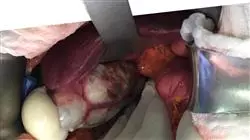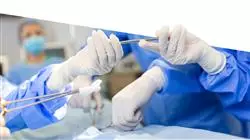University certificate
The world's largest faculty of medicine”
Introduction to the Program
You will delve into the symptoms of Undifferentiated Embryonal Sarcoma and how to reduce its impact on the health of your patients through this TECH Postgraduate certificate"

The increase in alcohol and tobacco consumption leads to more and more people suffering from liver cancer. Faced with this alarming situation, specialists have multiple clinical cases of patients with this type of pathology. For this reason, they take on the challenge of employing modern techniques aimed at treating this type of disease and improving the well-being of their patients. To this end, it is essential for professionals to be at the technological forefront in Hepatobiliopancreatic Surgery. However, keeping up with the latest trends can be an obstacle for them: reconciling their work and family life is already a real challenge.
To respond to this need, TECH is developing innovative training so that surgeons can further their knowledge while combining this with other activities. Under the supervision of distinguished faculty, this syllabus will expand therapeutic options and emphasize current trends in immunotherapy. The syllabus will cover the risk factors associated with an unhealthy lifestyle in order to understand the occurrence of hepatocarcinomas. It also addresses clinical scenarios and factors to keep in mind when selecting treatments. In this sense, surgical strategies will be analyzed, among which liver transplantation stands out. Students will delve into the metastasis of Colorectal Cancer and neuroendocrine tumors. In this way, they will perform the appropriate therapeutic procedures such as surgery, chemotherapy and immunotherapy.
Moreover, the methodology of this program reinforces its innovative character. TECH offers a 100% online educational environment, tailored to the needs of busy professionals seeking to advance their careers. Likewise, it employs the Relearning, methodology, based on the repetition of key concepts to fix knowledge and facilitate learning. In this way, the combination of flexibility and a robust pedagogical approach makes it highly accessible.
Delve into the diagnosis of less frequent epithelial tumors with TECH, the best digital university in the world according to Forbes"
This Postgraduate certificate in Malignant Liver Disease contains the most complete and up-to-date scientific program on the market. The most important features of the include:
- Practical cases presented by experts in Liver Pathology
- The graphic, schematic, and practical contents with which they are created, provide scientific and practical information on the disciplines that are essential for professional practice
- Practical exercises where the self-assessment process can be carried out to improve learning
- Its special emphasis on innovative methodologies
- Theoretical lessons, questions to the expert, debate forums on controversial topics, and individual reflection assignments
- Content that is accessible from any fixed or portable device with an Internet connection
You will approach Hepatoblastomas in detail and increase the chances of recovery of patients afflicted by this tumor pathology"
The program’s teaching staff includes professionals from the sector who contribute their work experience to this educational program, as well as renowned specialists from leading societies and prestigious universities.
Its multimedia content, developed with the latest educational technology, will provide the professional with situated and contextual learning, i.e., a simulated environment that will provide an immersive education programmed to learn in real situations.
The design of this program focuses on Problem-Based Learning, by means of which the professional must try to solve the different professional practice situations that are presented throughout the academic course. For this purpose, the student will be assisted by an innovative interactive video system created by renowned experts.
Do you want to perfect your technique in liver resection? Get it in 6 weeks thanks to this program"

Don’t miss this academic opportunity that allows you to choose your schedule in a personalized way"
Why study at TECH?
TECH is the world’s largest online university. With an impressive catalog of more than 14,000 university programs available in 11 languages, it is positioned as a leader in employability, with a 99% job placement rate. In addition, it relies on an enormous faculty of more than 6,000 professors of the highest international renown.

Study at the world's largest online university and guarantee your professional success. The future starts at TECH”
The world’s best online university according to FORBES
The prestigious Forbes magazine, specialized in business and finance, has highlighted TECH as “the world's best online university” This is what they have recently stated in an article in their digital edition in which they echo the success story of this institution, “thanks to the academic offer it provides, the selection of its teaching staff, and an innovative learning method aimed at educating the professionals of the future”
A revolutionary study method, a cutting-edge faculty and a practical focus: the key to TECH's success.
The most complete study plans on the university scene
TECH offers the most complete study plans on the university scene, with syllabuses that cover fundamental concepts and, at the same time, the main scientific advances in their specific scientific areas. In addition, these programs are continuously being updated to guarantee students the academic vanguard and the most in-demand professional skills. In this way, the university's qualifications provide its graduates with a significant advantage to propel their careers to success.
TECH offers the most comprehensive and intensive study plans on the current university scene.
A world-class teaching staff
TECH's teaching staff is made up of more than 6,000 professors with the highest international recognition. Professors, researchers and top executives of multinational companies, including Isaiah Covington, performance coach of the Boston Celtics; Magda Romanska, principal investigator at Harvard MetaLAB; Ignacio Wistumba, chairman of the department of translational molecular pathology at MD Anderson Cancer Center; and D.W. Pine, creative director of TIME magazine, among others.
Internationally renowned experts, specialized in different branches of Health, Technology, Communication and Business, form part of the TECH faculty.
A unique learning method
TECH is the first university to use Relearning in all its programs. It is the best online learning methodology, accredited with international teaching quality certifications, provided by prestigious educational agencies. In addition, this disruptive educational model is complemented with the “Case Method”, thereby setting up a unique online teaching strategy. Innovative teaching resources are also implemented, including detailed videos, infographics and interactive summaries.
TECH combines Relearning and the Case Method in all its university programs to guarantee excellent theoretical and practical learning, studying whenever and wherever you want.
The world's largest online university
TECH is the world’s largest online university. We are the largest educational institution, with the best and widest online educational catalog, one hundred percent online and covering the vast majority of areas of knowledge. We offer a large selection of our own degrees and accredited online undergraduate and postgraduate degrees. In total, more than 14,000 university degrees, in eleven different languages, make us the largest educational largest in the world.
TECH has the world's most extensive catalog of academic and official programs, available in more than 11 languages.
Google Premier Partner
The American technology giant has awarded TECH the Google Google Premier Partner badge. This award, which is only available to 3% of the world's companies, highlights the efficient, flexible and tailored experience that this university provides to students. The recognition as a Google Premier Partner not only accredits the maximum rigor, performance and investment in TECH's digital infrastructures, but also places this university as one of the world's leading technology companies.
Google has positioned TECH in the top 3% of the world's most important technology companies by awarding it its Google Premier Partner badge.
The official online university of the NBA
TECH is the official online university of the NBA. Thanks to our agreement with the biggest league in basketball, we offer our students exclusive university programs, as well as a wide variety of educational resources focused on the business of the league and other areas of the sports industry. Each program is made up of a uniquely designed syllabus and features exceptional guest hosts: professionals with a distinguished sports background who will offer their expertise on the most relevant topics.
TECH has been selected by the NBA, the world's top basketball league, as its official online university.
The top-rated university by its students
Students have positioned TECH as the world's top-rated university on the main review websites, with a highest rating of 4.9 out of 5, obtained from more than 1,000 reviews. These results consolidate TECH as the benchmark university institution at an international level, reflecting the excellence and positive impact of its educational model.” reflecting the excellence and positive impact of its educational model.”
TECH is the world’s top-rated university by its students.
Leaders in employability
TECH has managed to become the leading university in employability. 99% of its students obtain jobs in the academic field they have studied, within one year of completing any of the university's programs. A similar number achieve immediate career enhancement. All this thanks to a study methodology that bases its effectiveness on the acquisition of practical skills, which are absolutely necessary for professional development.
99% of TECH graduates find a job within a year of completing their studies.
Postgraduate Certificate in Malignant Liver Disease
Malignant liver disease represents a significant clinical challenge, being a group of neoplastic disorders affecting liver tissue. The most common forms include hepatocellular carcinoma (HCC) and cholangiocarcinoma, each with its unique characteristics and therapeutic challenges. Would you like to specialize in this field? At TECH Global University you will find the Postgraduate Certificate in Malignant Liver Disease that will help you achieve your goals. Designed for healthcare professionals, this program immerses you in the complex world of liver malignancies, offering essential knowledge for early diagnosis and effective treatment. Here, you'll acquire advanced skills in image and biopsy interpretation for accurate diagnosis of malignant liver disease. In addition, you'll explore the latest oncologic therapies and liver surgeries, including resection and transplantation techniques to provide your patients with more effective treatment options.
Learn about malignant liver disease
Through 100% online education, we offer you the opportunity to study a world-class program, accessing self-managed classes, innovative multimedia content and mentoring with an experienced faculty. As you progress through the program, you'll develop skills in managing associated complications, from pain control to the management of ascites and hepatic encephalopathy. In addition, you will examine the underlying causes of hepatic neoplasms and understand the risk factors that influence their development. You will also dive into the latest imaging technologies such as magnetic resonance imaging and computed tomography for a comprehensive evaluation of the disease. Finally, you will explore specialized surgical techniques for the resection of liver tumors, as well as the criteria for liver transplantation in selected cases. From this, you will know how to carefully manage postoperative recovery and possible complications, ensuring the best quality of life for patients. In addition, you will become an expert in the fight against malignant liver disease. Enroll now to transform your clinical practice and make a significant difference in the lives of your patients!







